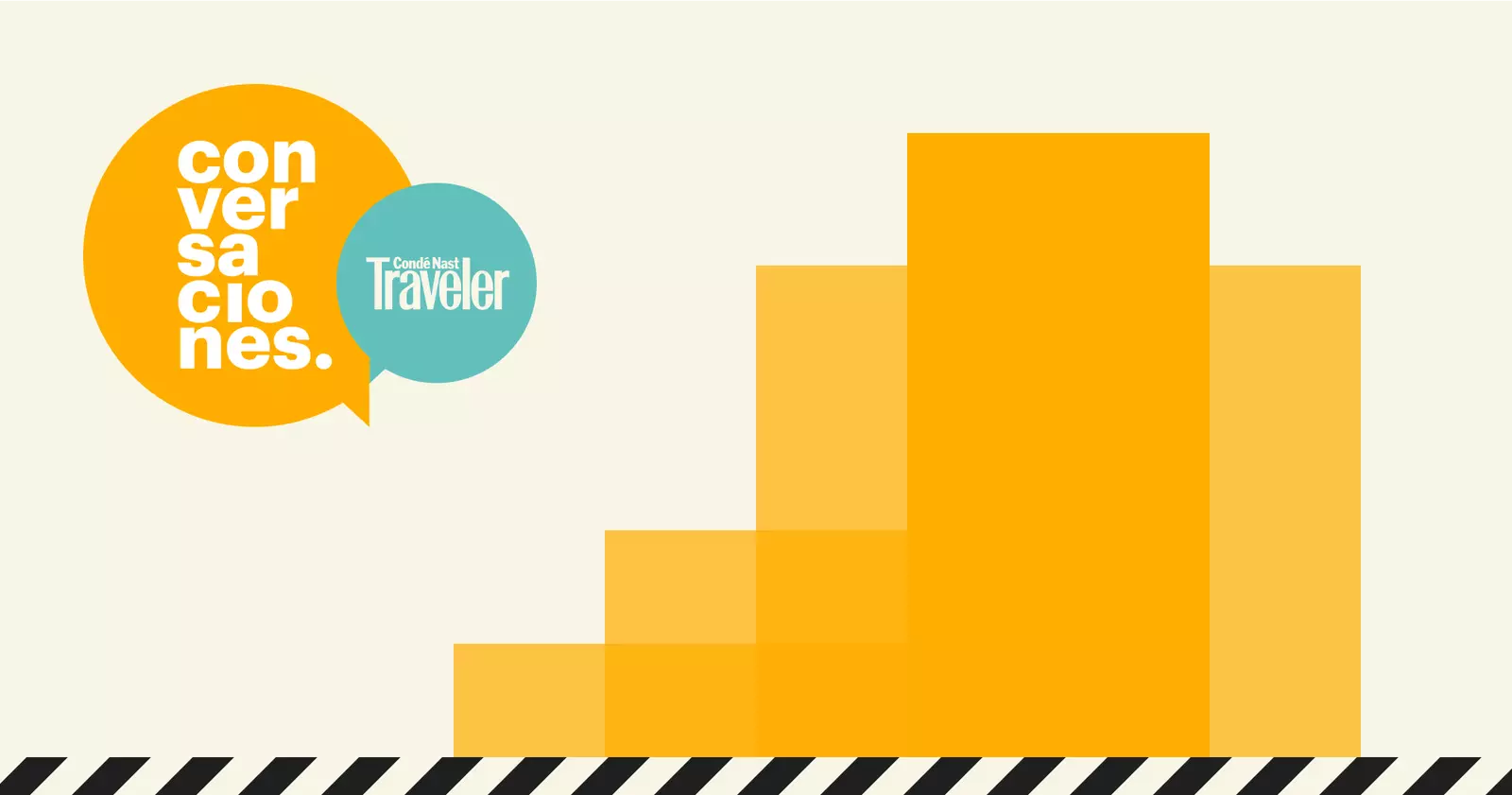
Hotels have been the protagonists of the second day of Condé Nast Traveler Conversations
What will hotels be like from now on? What are customers looking for? How is luxury going to be reinvented? Are safety and sustainability compatible?
These are some of the questions that have been raised on the second day of the Condé Nast Traveler Conversations , dedicated to those places that we miss so much and those that we love so much: the hotels.
HOTELS: GOLDEN CAGES?
The first 'conversation' of the day, moderated by travel journalist Arantxa Neyra has had four representatives of the hospitality sector in Spain: Eduardo Seisdedos (Deputy Director of Anantara Villapadierna), Álvaro Carrillo de Albornoz: (General Director of ITH), Diego Ortega (President and owner of Fontecruz Hotels) and Xavier Rocas (Delegate for Spain and Portugal of Relais & Chateaux).
Everyone agrees that the quarantine has been a time of a lot of work in which they have gone through several phases. What has life been like behind the scenes for hoteliers?
“The first phase involved the closure of the hotel and asking customers to leave early; then came the management of the ERTEs –almost 96% of the workforce–“, comments Eduardo Seisdedos, deputy director of Anantara Villapadierna.
“After we had an adaptation phase, we began to work with the NGO of chef José Andrés, World Central Kitchen and we gave up our central kitchen, distributing 900 meals a day to families on the Costa del Sol. There was a great involvement of volunteers, chefs and professionals from the sector in the area who were unemployed at the time”, continues Eduardo.
And he concludes: “Now we are in a third phase in which we will reopen on June 26 and we are working with the approach of what the opening will be like, protocols, new safety and hygiene measures, etc.”
Alvaro Carrillo de Albornoz , CEO of ITH, comments that “we have been very busy because we have had open and medicalized hotels. In addition, we have also done studies on what technologies were necessary. There has been a very intense work”.
Xavier Rocks , delegate for Spain and Portugal of Relais & Chateaux, for his part, says that For a few days they have been preparing with great enthusiasm the reopening, which will also be on June 26.
For Diego Ortega , president and owner of Fontecruz Hotels, It has been quite a complex job having to manage hotels in Spain and Portugal.
“The first phase was pretty nasty but then we started to come to terms with things a bit and try to see how we could bounce back. It is proving to be very hard and difficult work and I think that in the end it will be a matter of trust”, affirms Diego.
“We will open some hotels at the end of June and others in mid-July. It is a good time in the sense that it is summer and I want to be optimistic. I think the whole sector is doing things very well, there are great professionals”, concludes the president of Fontecruz Hotels.
REINVENTING LUXURY WITHOUT LOSING THE TOUCH
Some time ago the term 'luxury' ceased to correspond to the definition of the RAE to go further. “We are going to have to reinvent luxury and rewrite it again in the new situation” , comments Arantxa Neyra, who asks the guests the following questions: What is the customer looking for now? Have you noticed that they demand more privacy? How are you implementing technology in accommodation?
“I think things are not going to change as radically as you think. Yes, it is true that measures, cleaning, distancing, etc. will be reinforced. but in the end, the key is to find a balance so that the guest does not find himself with an experience that is very different from before and try to guarantee these hygienic and sanitary measures” , comments Eduardo Seisdedos.
“Our clients ask us about rooms with larger terraces and about the villas. Clients – especially from Madrid, the Basque Country and Catalonia – are booking longer stays, from 8 to 19 nights, and we are also seeing family reunions that could not be held during confinement such as anniversaries and birthdays that were pending. There the villas are gaining prominence”, continues Eduardo.
Also, At a technological level, Anantara Villapadierna has developed its own application to carry out many of the procedures that were previously done from the hotel reception such as running a restaurant, room service, etc.
Xavier Rocas affirms that “people are looking to have more space, to enjoy the room more”. At Mas de Torrent Hotel & Spa, for example, they have seven rooms with a pool and a villa, which are currently the most popular.
“Clients are going to want to minimize risks on their vacations. There will be fewer and longer trips to minimize moments in airports, stations, etc.”, adds Álvaro Carrillo de Albornoz, who believes that internally the changes will be less noticeable in a luxury hotel in that sense.
Diego Ortega also confirms that they are finding longer reserves and adds that "The luxury this time is being able to go out and do the things we haven't been able to do in these four months."
In fact, One of the activities at La Casa del Presidente, in Ávila, is to gaze at the stars. “In the bedroom, technology is going to be important, but I also think that in the end people will want to walk, breathe, and more right now,” says Ortega.
THE RELATIONSHIP WITH THE CUSTOMER
Regarding the relationship with the client, caution and safety guarantee prevail. You have to be very careful with direct contact and the technological part is going to be important, as it includes interesting elements such as virtual tours or letters with QR code.
Nevertheless, “It is also a good time to get closer to the customer. You have to try to manage everything before he comes: will he want breakfast? do you need parking? We can reserve and close everything. In this way, the client will notice that everything is pre-contracted and they have continuous contact with the hotel”, says Diego.
In addition, this whole situation can be an opportunity to build customer loyalty Well, as the president and owner of Fontecruz Hotels points out, many customers will be customers who have previously stayed in the accommodation and it is a good time to strengthen relationships.
WHAT LESSON DOES THIS SITUATION LEAVE US?
What can we learn from the situation we have experienced and are experiencing in the future? We all hope that the current crisis is temporary, but there are several lessons we have learned and situations that have brought out the best in each of us.
The human component has been a fundamental element in this regard: “all this crisis that we have suffered has given rise to very honest and beautiful interactions that we have been able to appreciate in emails and in different contacts that we have had with clients”, says Eduardo, who affirms having met with "an even stronger community spirit among employees."
“And we have also realized that we are very vulnerable. We have to take advantage of the digital issue and technology”, adds Xavier, who also stresses the vital importance of human capital.
Diego, for his part, defends that travel is a sector on the rise and that despite the fact that the situation has broken the waterline of what has been gained in the last ten or fifteen years, everything will return to cruising speed with time”.
Will we get to see a robot receptionist or serving us breakfast? "Let's hope not!" they all exclaim. Or at least not in luxury hotels.
THE USER EXPERIENCE IN THE POST-COVID WORLD
The second talk of the day was given by Rocío Abella, a partner at Deloitte Digital, who discussed the importance of the user, which in the end is the importance of people, managing people in a post-Covid-19 world.
In a pre-Covid world we were used to a changing environment where we were aware of the horizon –how we behave, how we buy, how we consume, how we interact– where companies considered that the greatest asset was customers.
In this sense, digital transformation takes on a fundamental role for three reasons. First, because our client changes: before we worried about running out of battery or not finding wifi).
Secondly, because we are seeing exponential technologies, such as the impact of mobile phones in our day-to-day life. “Data, technology in cloud format, social networks have been very disruptive but now they are with us. What we don't know is what role artificial intelligence, drones or the internet of things will play," explains Rocío.
And thirdly, because new business models appear that break with the established rules, such as Uber, WhatsApp, Alibaba, Facebook or Netflix. "It is thanks to all of them or in spite of all of them, the models are changing," says Rocío.
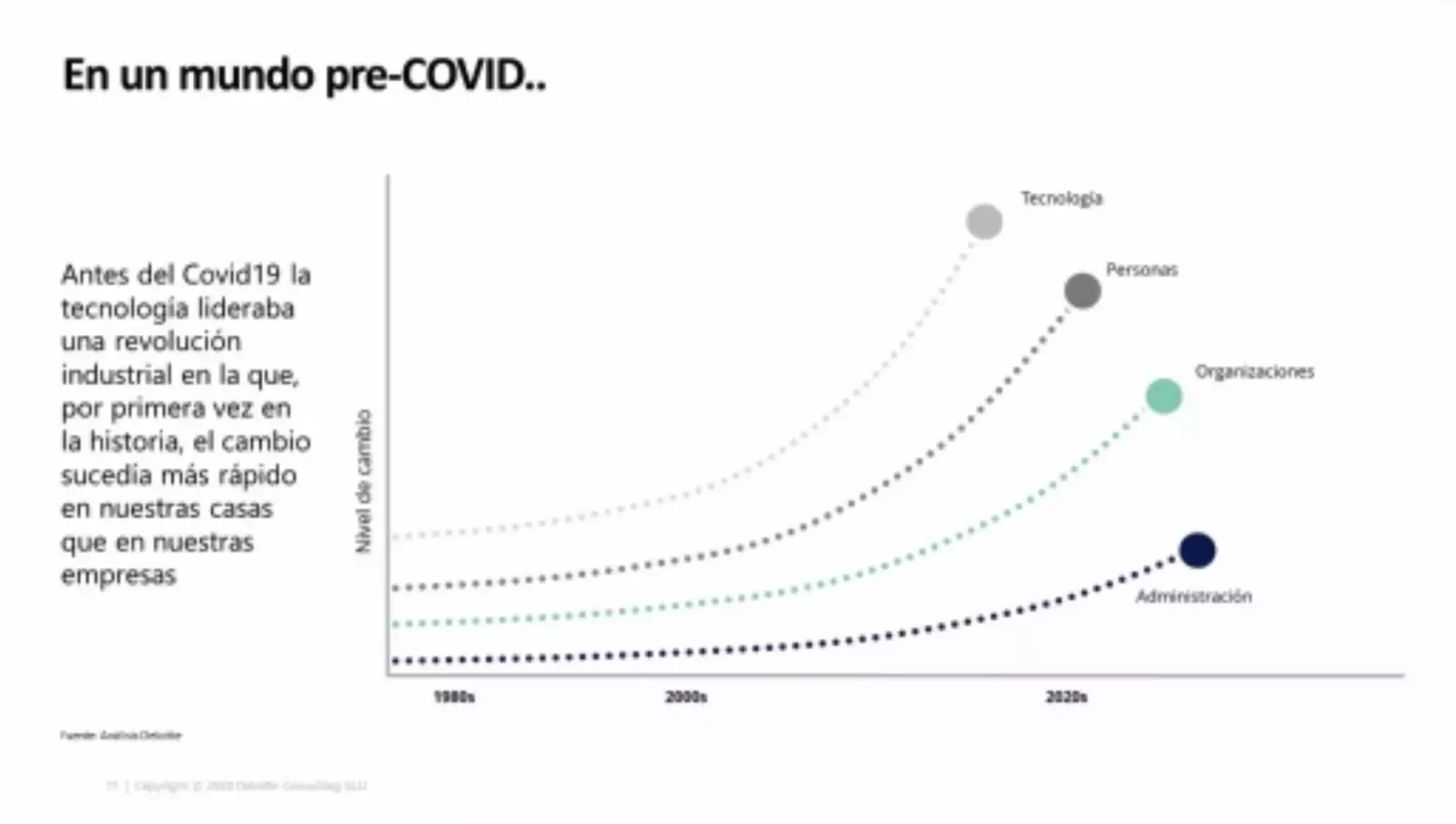
In a pre-Covid world
2020: WHAT ARE WE FACING?
Before covid-19, technology was leading an industrial revolution in which, for the first time in history, change was happening faster in our homes than in our companies. In a post covid world, what changes is the model of organizations.
Covid-19 has accelerated the way people relate to technology, assuming an opportunity for organizations to evolve the way they manage talent.
2020 poses a completely unexpected new context due to the global pandemic where evolution, adaptation and change are no longer an option but a must do.
We need to adapt. Only companies that can continue to offer customers a safe, quality, personalized and differentiated service they will be able to survive the environment of the New Normal.
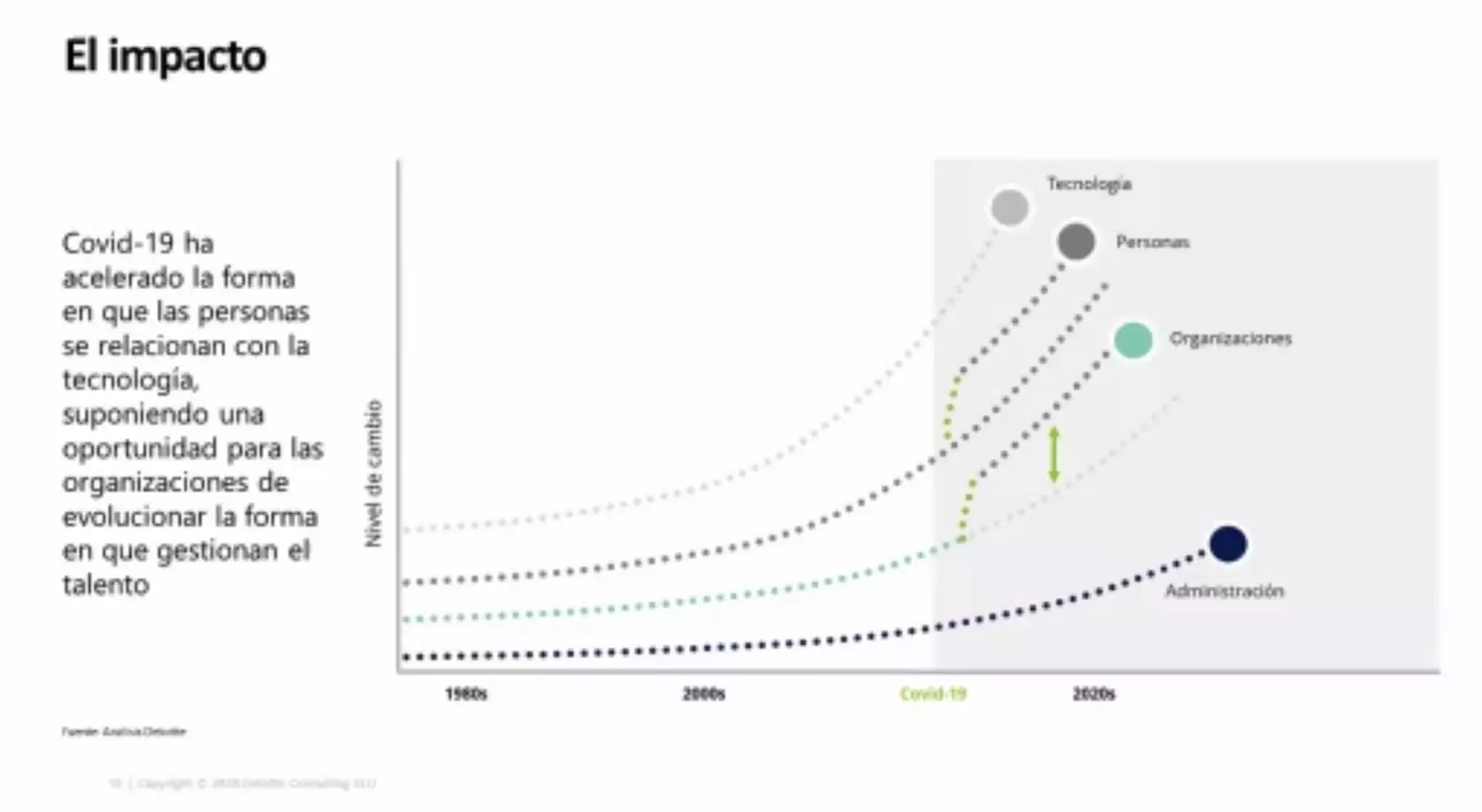
The impact
IMPACT OF COVID-19 ON THE HOSPITALITY SECTOR
The trends and challenges that marked the next set of the market have been accelerating as a result of the situation.
Thus, Rocío explains that right now we are facing the following scenario: greater relevance of the online channel, increase in phygital experiences, contraction in demand, the shift from mass market to personalization and the trust economy.
What elements are going to be key in this post covid world? “ The pre-checkin, the option of transfer to the hotel, the check-in itself, the enjoyment of the room and the facilities and the personalized check-out”, points out the Deloitte Digital partner.
Are organizations prepared for these challenges? There are many questions that arise when facing the new situation: What will happen if our employees are not prepared? What will happen if the employee is afraid at work? What will happen if the leaders do not get involved? What will happen if they do not have the necessary digital capabilities?
“The pillars of action that organizations must take into account are four: culture, leadership, learning and analytics ”, points out Rocío Abella.
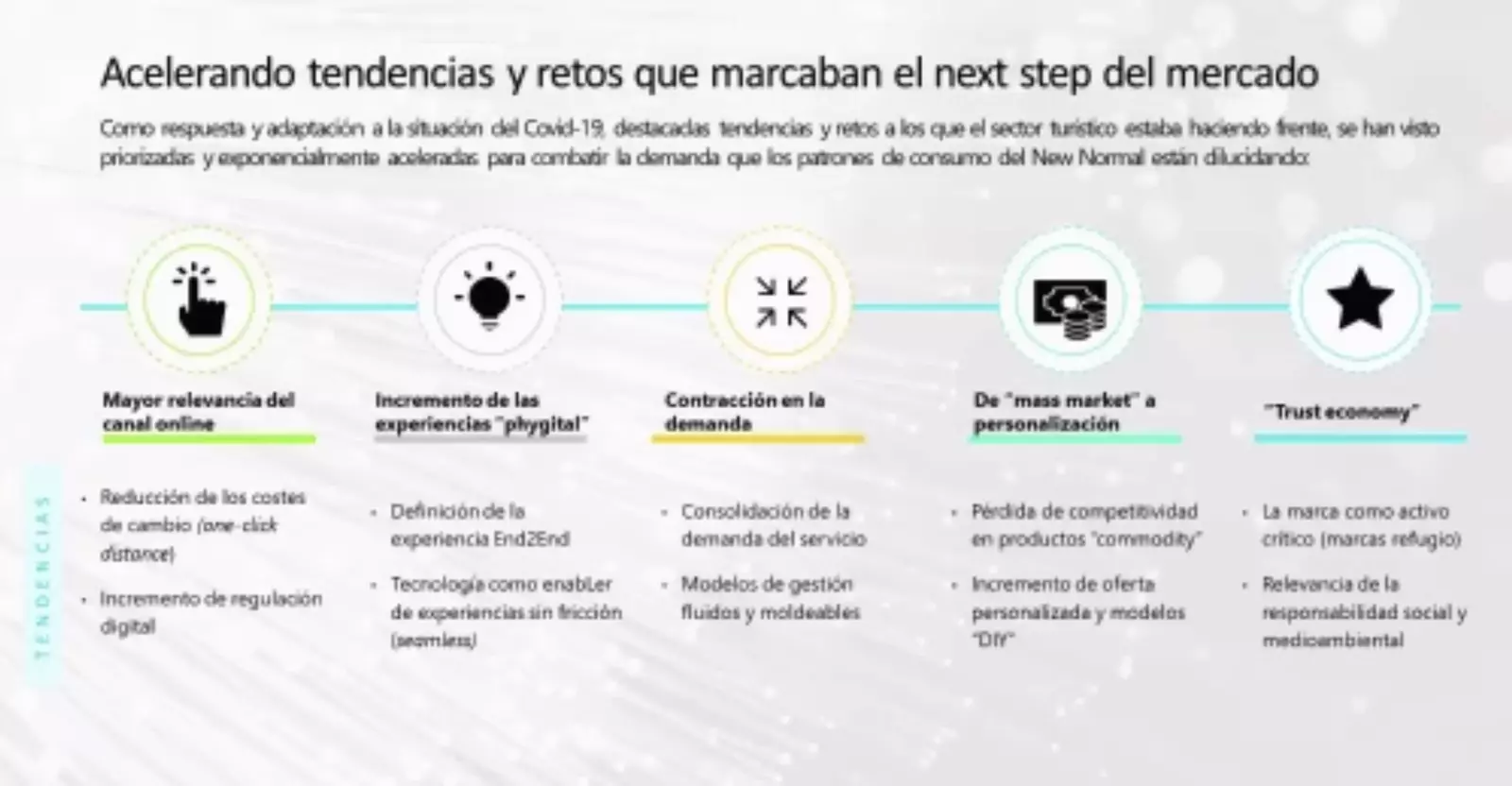
Accelerating trends and challenges that marked the next step of the market
CULTURE, LEADERSHIP, LEARNING AND ANALYTICS
Regarding the cultural element, “organizations must take advantage of this moment. They must know how to give a sense of contribution, manage employee commitment and promote new structures: more agile and collaborative ways of working”, points out Rocío.
As far as the leadership , we must highlight two terms: upsiking and reskilling , in short, the development of key capabilities.
“The importance of listening, putting oneself in another's shoes, the ability to solve problems as well as being flexible and showing the ability to adapt These will be some of those key capabilities”, explains Rocío, who also emphasizes the importance of going beyond diversity and generating inclusive leaders in order to achieve high-performance teams. In summary, develop an inclusive Leadership Model fostering innovation, agility and high performance.
In the learning section the trend towards creating learning experiences rather than training events it becomes a point of connection between companies that want to evolve and develop a culture of learning.
New formulas must be implemented** to accelerate development and develop digital capabilities.**
Thus, you can go from providing training to: create knowledge, consolidate a learning attitude; create hyper-connectivity and spaces to share; promote immediacy (“I want it, but I want it now”); solve, support and accompany; take advantage of the ecosystem that surrounds us; have the accompanying technology; and prepare leaders as generators of micro-experiences.
Lastly, in regards to the analytics , there is a voracious hunger to consume data and information, however, the key is what we question, not what we analyze. "In this tsunami of data, more than 50% of it is frozen," says Rocío.
There are several challenges at this point: have an asset, improve the ability to exploit the largest universe of data; being able to consolidate and exploit multi-device information; being able to make decisions in real time to play with scenarios; have information self-service by hotel and corporate directors; and help the business in decision making and efficiency
SPEED AND ADAPTATION: THE SECRET OF SUCCESS
It is no longer about the biggest beating the smallest but the fastest beating the slowest. In this sense, Rocío adds five golden tips to be successful in this new stage that is presented to us:
- It is a moment that matters: it generates trust in customers and employees
- Engage your employees, they are your most valued asset
- Leaders are the key: focus on them as a lever for adaptation
- Ensure the development and preparation of your employees.
- Use the info for what is relevant. Exploit data for adaptive resource planning
It is difficult to know if all these changes that we have alluded to are going to stay forever or will start to disappear when everything returns to normal a little. “Instead of trying to predict the future, we will have to walk. This has been a spectacular impact. I think that there are a series of things that have been left to stay and others that have not”.
Will there be enough time for businesses to readapt this season? Possibly not, we have the situation on us. But the one who acts the fastest, the one who is most able to be prepared, will be the one who really wins the battle. And always keeping in mind that the more technology we have around us, the more the human factor matters.
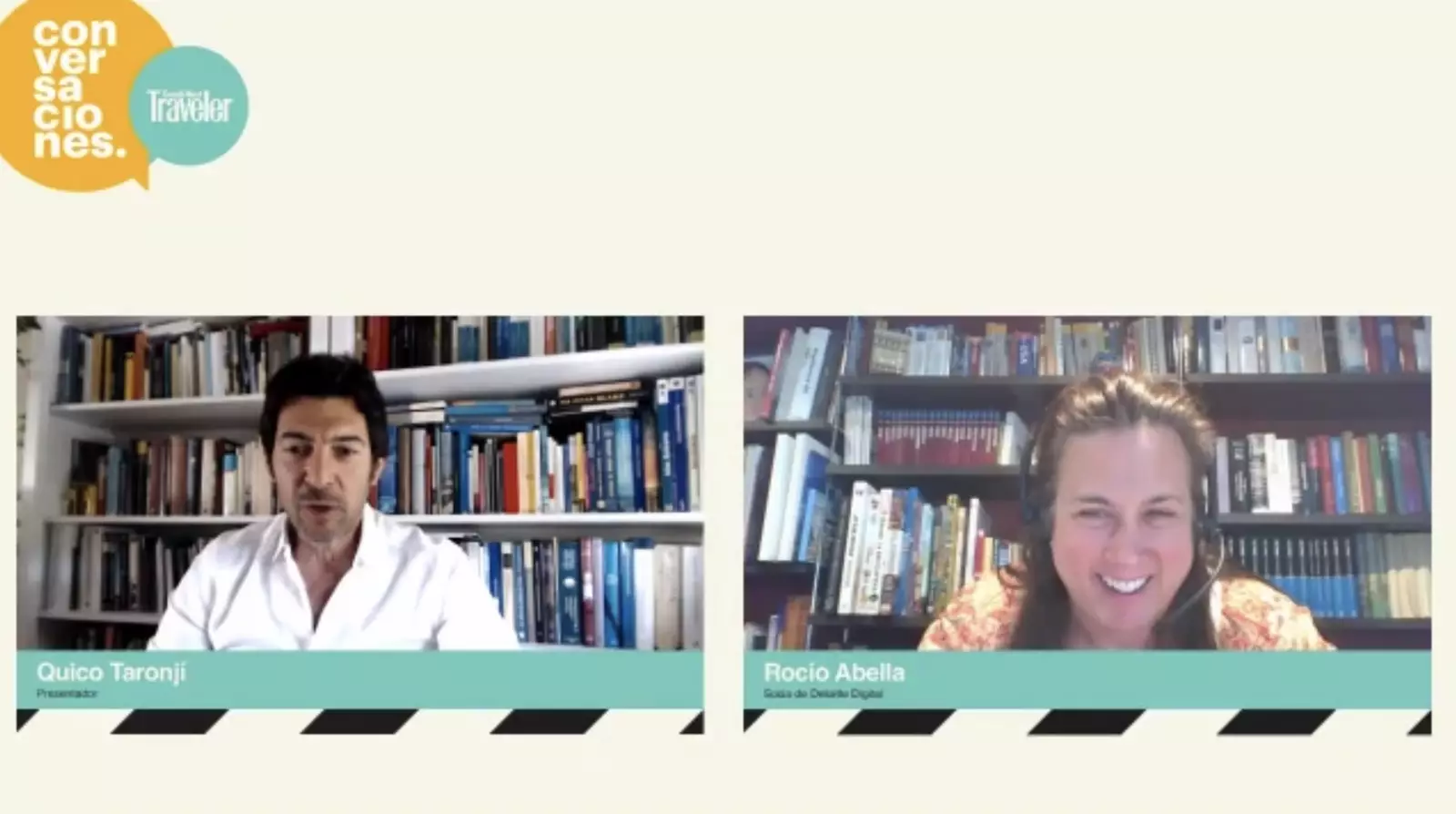
Condé Nast Traveler Conversations
SPAIN FULL? AN OPPORTUNITY OF REINVENTION FOR THE RURAL DESTINATION
It was already a trend before the virus entered our lives. Provide a solution to the emptied Spain while combating the problem of overtourism represented one of the great hopes of national tourism.
The current situation puts on the board even more reasons to bet on rural destinations, without crowds and in contact with nature , and promote its tourism development from quality and responsibility.
The third of the Condé Nast Traveler Conversations on Tuesday, June 16, moderated by David Moralejo, Director of Condé Nast Traveler , has focused precisely on that rural tourism of which the magazine itself has become a bit of a spokesperson.
“From Condé Nast Traveler we are committed to rural tourism and in this I am both optimistic and critical. I have the feeling that we have a lot to do but also that we have worried too much about sun and beach tourism and we have fallen a bit behind in other fields”, says David Moralejo.
“It is a luxury to have something like Paradores in Spain. In the case of Rusticae, a seal of quality that elevates us and, in the case of Restaurante Lera, an example of high-level gastronomic tourism” , says Moralejo, referring to the three participants in the talk: José Carlos Campos (commercial director of Paradores), Sara Sánchez (CEO of Rusticae) and Luis Alberto Lera (owner of Restaurante Lera).
OPTIMISM VS. CRITICISM
"If there is any moment in which rural tourism is prepared to face a challenge like the one that is presented to us, it is this" comments José Carlos Campos.
“You have to be prepared and do things very well, so that our clients leave with a feeling of absolute security. We have open spaces and few crowds, we are very well placed in that sense ”continues the commercial director of Paradores who believes that they will rise to the occasion this season.
In addition, José Carlos emphasizes that it is important to frame the sun and beach not only in the first line of overcrowding but in rural settings: “there are totally idyllic places near the beach but not in the first line. At Paradores, our leitmotif is to place ourselves where massification does not reach. 30 of our 97 inns are in towns with fewer than 5,000 inhabitants and are in high demand”, he concludes.
Sara Sánchez, for her part, affirms that sustainability is in the DNA of Rusticae, which has more than 25 years of experience: “we are committed to responsible tourism, understood as respect and tolerance for diversity. We fight for that independence and that tourism based on proximity, on trust (one of the things that is most in demand right now)”, he comments.
The CEO of Rusticae believes that tourism must have some fundamentals of care and respect for the territory, its inhabitants and its heritage: “The crisis has made us stop but I want to think that now we are going to be able to travel in a different way, being more careful with the environment. By stopping we have been aware of the need to take care ”.
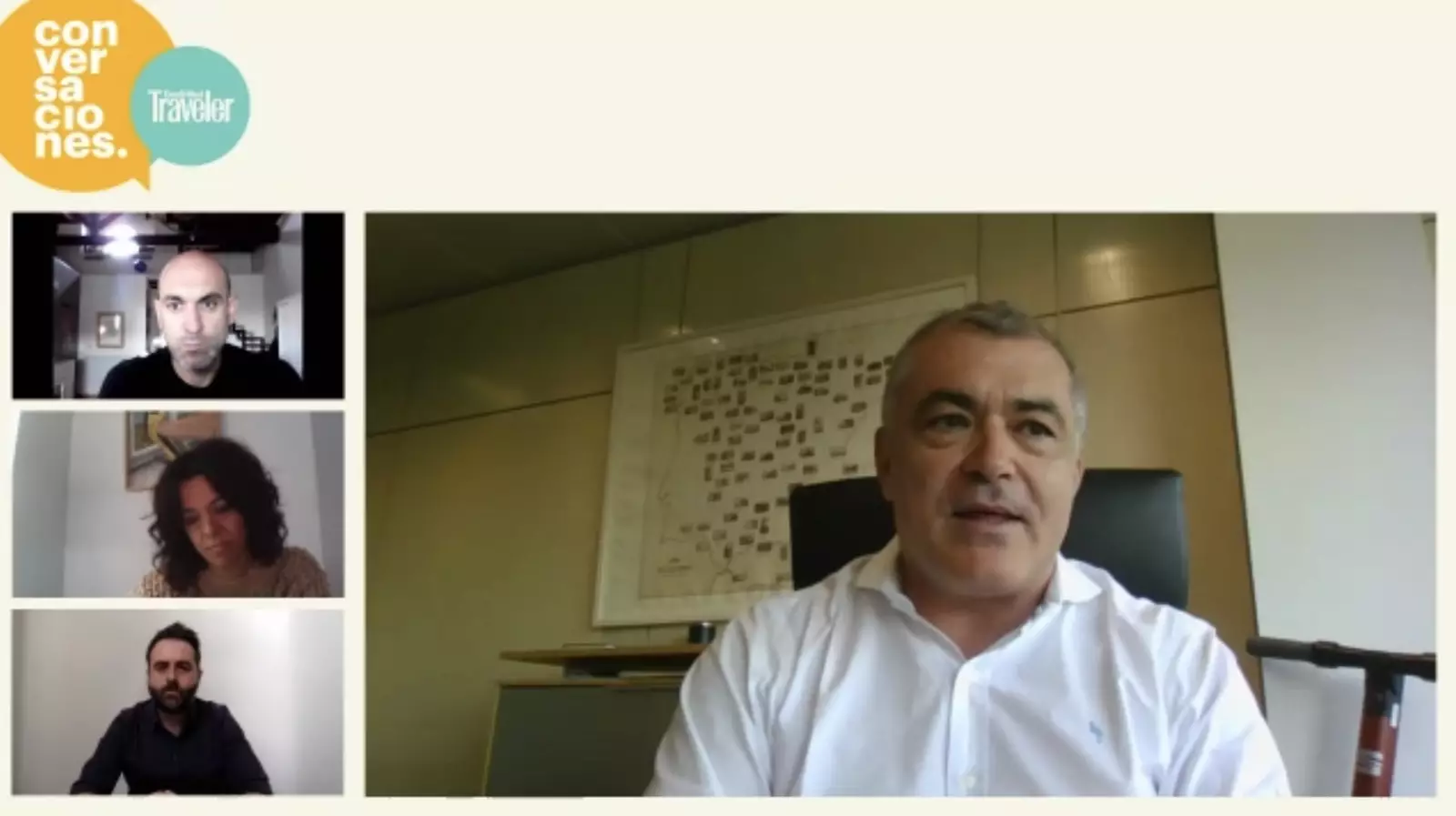
José Carlos Campos (commercial director of Paradores), Sara Sánchez (CEO of Rusticae), Luis Alberto Lera (owner of Restaurante Lera) and David Moralejo (Director of Condé Nast Traveler)
Luis Alberto is also optimistic: “If it wasn't, I wouldn't have set up this hotel here, in Castroverde de Campos (Zamora)”.
The owner of Restaurante Lera has it very clear: “Empty Spain is the Spain of opportunities. We cannot provide security because nobody has it, but we can sell that security of empty spaces and few crowds”.
“The critical part is that I think we are late, in Spain we have focused too much on that tourism that we have all done, that of sun and beach”, comments Luis Alberto, who believes that inland tourism should be of high quality because it is the only way to attract that tourist tired of the crowds.
“We must have quality spaces, sell the environment and the culture and something very important: the idiosyncrasy of each place”, although he insists: “I think we are a little late compared to neighboring countries like France. We must always do something differentiating, sell uniqueness, help local producers. That, in the end, is tourism too”, concludes Luis Alberto.
WE HAVE THE PRODUCT, NOW WE HAVE TO MARKET IT
“I think there is a feeling that what has happened can serve as a springboard. We saw a trend of change and support for rural tourism and it seems that we are facing the light at the end of the tunnel that can help us, says David Moralejo.
And he also makes a comparison with rural tourism in other countries: "We always talk about Provence, Tuscany, and then we invent surnames to talk about ours: the Provence of Teruel, of Lleida...".
In Spain we have an exceptional product but we must reach customers. Sara Sánchez believes that, indeed, there is a phase to which we are not late: the product, “what happens is that other territories have created their brand. We have the product created but we still need to make it known and attractive. We lack marketing and reaching that final consumer”, says the CEO of Rusticae.
“Each independent hotel that sets up accommodation is generating a very powerful local and circular economy. Our hotels are spaces that have invested to create quality accommodation and around it are the local producers of the territory”, explains Sara.
If there is no landscape, there is no tourism, and for there to be a landscape, it has to be cared for and population fixation is necessary. , that businesses are sustainable and profitable. For Sara, "every independent hotelier that has set up her space has a very important value, they have carried out quality tourism."
José Carlos totally agrees: “The product is there, but we need icons and people who notice us. Now we have an opportunity to show what we are”.
Without going further, the newly opened Parador de Costa da Morte is full until September and around it there are restaurants that are now reopening, paths, small hotels and inns, rural accommodation...
“That is the way we want to teach our national and international clients. Depending on how we do it, how we promote it, we will have a lot of air in this type of accommodation and restoration. Now it's time to demonstrate that what we have done well we do excellently, that the client feels safe with absolute confidence”, affirms José Carlos.
We are facing a situation in which there is a great opportunity to show people that this little-crowded tourism is the tourism of the future, and this is how the commercial director of Paradores defends it: “Our client is telling us that he flees from overcrowding and macro-destinations. This may be the beginning of the loyalty of this type of customer. We are facing a tremendous opportunity to seasonally adjust rural tourism, which seems to have been identified with Easter or the Pilar bridge until today.
TAKE CARE OF OURSELVES
It is time to look within. All representatives of rural tourism agree and see it as more necessary than ever.
“We must take advantage of the great products we have in this country. If we now ask Spanish citizens if they know Teruel, Jaén or Cuenca, they probably know Bali or Singapore more”, says Luis Alberto Lera.
We have a unique country, with a unique idiosyncrasy. We must know our environment, our country. "It's time for everyone to put their shoulders to the wheel to get ahead," encourages Luis Alberto.
And we not only take care of our territory, but we take care of ourselves: "Consume that nearby product, seasonal food, connect with our nature... This tourism helps you take care of yourself," adds Sara.
“It is the word of the year: take care of yourself –says David Moralejo– take care of ourselves, take care of our landscape and bet on it for this summer and everything to come”.
WHAT HAPPENED TO SUSTAINABILITY?
Although during confinement the planet has breathed, the return implies great challenges that now have to be faced. When, until a few months ago, hotel chains made great efforts to update their strategies to eliminate plastics, promote renewable energies and combat food waste, single-dose bags, bags and the craze for disposables are back.
Is there a way to combine safety with sustainability? That is the issue that has been addressed in the debate moderated by Gem Monroy (editor-in-chief of Condé Nast Traveler) and in which they have participated Rebeca Ávila Álvarez (VP Communication & CSR Southern Europe in AccorHotels), Rodrigo Moscardó (chief operations officer of Iberostar Hotels & Resorts) and Carles Cabanillas (responsible for Public Relations at Hostal Spa Empúries).
The three represent three brands in which sustainability has always been a fundamental part. In the case of Iberostar (114 accommodations) and Accor (4,200 accommodations), they have two of the most ambitious programs.
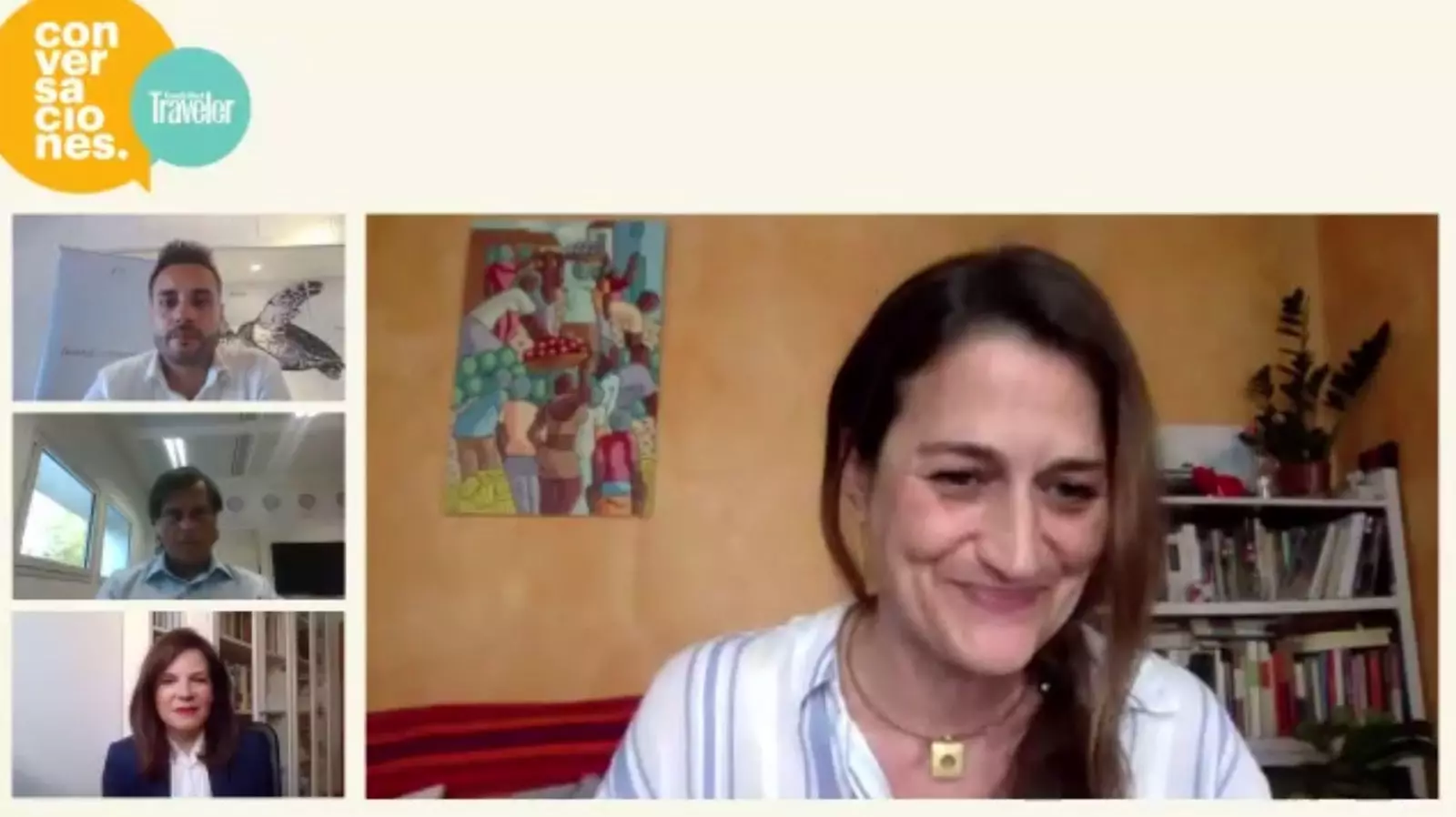
Gema Monroy (Editor-in-Chief of Condé Nast Traveler), Rebeca Ávila Álvarez (AccorHotels), Rodrigo Moscardó (Iberostar Hotels & Resorts) and Carles Cabanillas (Hostal Spa Empúries).
“We are in a phase in the world of travel that we have just been confined for three months in which borders have been closed. We must focus on transmitting security and trust but at the same time commit to sustainability”, says Rebeca Ávila.
“At Accor we have launched our own seal called all safe and a series of protocols that go even a little further. We are going to put the seal on the hotels that have really gone through a whole certification process”, says Rebeca, who believes that at this complicated and uncertain time “What prevails is safety, hygiene and trust, but this does not mean that commitments in the area of corporate social responsibility can be maintained in parallel”.
The Accor chain already announced in its day the removal of plastic from its accommodation “and it is a commitment that we are going to keep, but if at a certain moment we have to use plastic gloves, it will be done.”
In addition, in the security area they have reached an agreement with Acsa to guarantee medical teleassistance to clients: “If there is a sector that has made a show of CSR during this period, it is the hotel sector, since we made hotels available to the authorities to accommodate patients and health personnel, state security forces and bodies, carriers, etc." Rebecca comments.
IS IT POSSIBLE TO COEXIST BETWEEN SECURITY AND SUSTAINABILITY?
"It seems that we had gotten rid of plastic and now we see it everywhere again," says Gema Monroy , which asks her guests the following question: is health security at odds with sustainability or can they coexist and even enrich each other?
"Our way of thinking is that we must provide safety and hygiene to the client, but the great challenge is to do it with our marked sustainability principles", points out Rodrigo Moscardó, from Iberostar, where they have fulfilled a commitment to completely eliminate plastic.”
“That has taught us that we have to force a bit and not let ourselves be carried away by what the suppliers offer us, but instead ally ourselves with them and establish a collaborative relationship”, continues Moscardó.
“We have found reusable masks and gloves to avoid disposable ones as much as possible. It is true that in very specific matters it is not possible and the legislation obliges you, but you will have to have a waste collection system”, he points out.
Rebecca thinks “safety and sustainability have to be enriched and everything has to be done from the maximum coherence. In our company DNA we have always taken sustainability into account. In this period, the approach we are taking is to build bridges between the two areas, although security must be prioritized above all else. of our employees and our clients, working on these protocols, but at the same time making this reality compatible with these sustainable commitments”.
In this sense, “In a timely manner, if plastic has to be used in certain elements, we are going to allow it but that does not mean that this moment can be used to undo all the work done. You have to be serious and keep those commitments”, concludes Rebeca.
Carles Cabanillas, head of Public Relations at Hostal Spa Empúries, resigns himself to thinking that the situation forces us to go against sustainability In fact, they pose it as a challenge: “Our project is something very ambitious that also wants to offer positive impacts. We try to find formulas to maintain sustainability in everything we can. There are things in which the new regulations force you to use plastic, but we try to maintain our sustainable philosophy in everything”, explains Carles.
The Hostal Spa Empúries, located in Girona, opened a couple of weeks ago in a kind of pre-opening with a few rooms to start the implementation of the protocols: "It is a small hotel with 55 rooms where sustainability can be easier to apply," says Carles.
WHAT ARE THE MOST CONFLICT POINTS?
There are things that are here to stay and that are more sustainable, such as the theme of the menu. At Hostal Spa Empúries, for example, they have installed a very discreet QR code on all the tables and they are going to try to maintain this.
Some more complicated elements are the theme of the restaurant and the floors: "We have to put the clothes and waste in closed plastic bags that go directly to the laundry, we didn't do that before but now we have to," says Carles.
"Furthermore, in the restaurant, the fact of offering single-dose seems contrary to our philosophy , then, the dishes come out directly seasoned from the kitchen and if the client wants more, we have disinfected containers. We always look for the alternative that allows us not to have to use some practices”, explains the person in charge of Public Relations at Hostal Spa Empúries.
The crisis has made accommodation reflect and come up with new formulas that until now worked like the breakfast buffet: "Now we are working on new buffet formulas such as an assisted buffet in which the client will be able to continue enjoying the variety of a buffet but now it will be an employee who will assist the client to minimize contact," explains Rebeca, from Accor.
“You have to try the formulas and see if they work or not. These are very extensive and exhaustive protocols that go by areas: room, common areas, restoration. We are in a moment of adaptation and the restoration is going to have to do a job of reflection”, concludes Rebeca.
Gastronomy is one of the most complicated and difficult elements to approach, but that does not mean that sustainability has to be left aside, quite the contrary. . For example in Ibersotar They have a plan to defend the oceans and support artisanal and sustainable fishing called Wave of Change.
“Gastronomy in our sector is a tangible element that is very important. Fishing and defending the oceans is one of our pillars. This program is based on making all our fish consumption responsible by 2025. This year is 40% responsible fish consumption the goal. They are grains of sand that we are advancing in our program”, says Rodrigo.
For its part, at Hostal Spa Empúries they work with a product that is not only local but their own: “We have about four hectares of crops from which we get almost all the fruit and vegetables that are cooked in the hostel, meat and fish are very close. We also collaborate with the cuttlefish project to recover fishing in the Escala area”, explains Carles.
“At Accor we have a charter with a series of commitments in which we have put the focus on the dossier of food waste. Today, it is inconceivable that so much food could be wasted in a hotel. We have launched programs adapted to each type of hotel” says Rebeca.
WILL WE BE MORE CONSCIOUS FROM NOW?
Rebeca Ávila, Rodrigo Moscardó and Carles Cabanillas agree that this situation is making us much more aware of our impact on our planet and that we will be more demanding in terms of sustainability in the future.
“We have become aware that this is serious, that we only have one planet and that we have to take care of it. Sustainability is going to take a lot of strength, the client was demanding it and is going to demand it much more”, says Rebeca.
**Rodrigo also launches a key question: “in addition, it should be noted that sustainability is profitable. **Measuring waste later allows you to reduce and in the end it is a cost reduction. Everything that has to do with sustainability is profitable.”
And let's not forget the importance of engaging staff in sustainable engagement: ”In our case, the staff has always been an essential factor in driving sustainability forward. He is very used to working with the guidelines and philosophy of the hotel”, says Carles.
Regarding the first clients and the first experiences, Carles says that they are taking it very normally: “They highly value being able to travel again, they assume any measure that is taken naturally and understand it. They know that this is what it touches for the moment”
"And what's more, some clients write to you and ask what we have done to respond to the pandemic and they look for that security and that regulation”, he adds.
